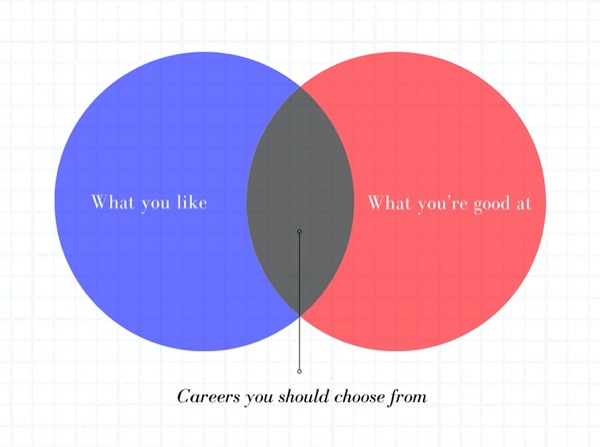How to Figure Out What You Want to Be When You Grow Up
It’s the most important question you’ll answer in the next five years.

Image by: Kari Shea
The career you choose will have more of an impact on your life, productivity, and happiness than any other decision you make (along with who you marry—if you marry).
But how are you supposed to pick the career that is going to make you the happiest, richest, most fulfilled person you can be when you have trouble picking a movie to watch?

The two ingredients you’ll need
To figure it out, you’ll need to answer two questions:
- What do I like doing?
- What am I good at?
Both are critically important. When people end up in the wrong career, it’s usually because they focused on one question but not the other (or worse, neither!).
If you only focus on your interests, you could end up in a job you were interested in but aren’t very good at, frustrated because you aren’t excelling and progressing.
If you focus only on what you’re good at, you could end up in a career where you excel but are miserable because you hate what you do.

Why interests are important
Your interests are what you like doing and learning about. When people say you should “follow your passion,” they are talking about interests.
You’re much more likely to put in the hard work it takes to be great at something if you’re interested in it, so it’s good advice.
But it’s incomplete. Just because something interests you doesn’t mean you’ll be good at it.

Which is why your talents are as important as your interests.
Why talents are important
Your talents are what you are naturally good at. Having a talent for something doesn’t mean you’re the best—it just means it’s an activity that comes easy to you, easier than most things.
Talents show us the types of work our personality and brains are built to excel at.

If you pursue a career that emphasizes things you don’t have any talent for, you’re likely to end up frustrated.
It will be a struggle, and you won’t be as successful as other people who do have those talents.
Follow your obsession, not your passion
Michael Moritz, a billionaire investor, calls this intersection of interests and talents your “obsession.”
Here’s why “follow your obsession” is a better guide than “follow your passion.”
1. You won’t get obsessed with something you aren’t interested in.
Think back to the last time you were obsessed with something (maybe that’s right now). There may be several reasons you got obsessed with it, but I guarantee you one of them was “I really like doing it.”

2. You won’t get obsessed with something you aren’t good at.
You may have an initial burst of enthusiasm for something, but in the long run, you’ll move on to something else if you don’t see success.
This is true in any area of life. Losing isn’t fun—we’re drawn to activities we can win at.

Obsession lives off a positive feedback cycle: you have a little success, which makes you more committed to improving, which leads to even more success.
Discovering your interests
If you aren’t sure what your interests are, here are three ways you can start figuring them out.
1. Ask yourself when you feel most alive
Emotion is a powerful clue. When do you feel happiest, most energized, and most excited about life? Are there any times where you get so involved in an activity that you lose track of time?
These are clear indicators that you’re doing something you’re really interested in.

2. Expose yourself to new ideas
You can do this through reading, watching YouTube videos, reading blogs, listening to podcasts and audiobooks, or talking to interesting people.
The important thing is to be curious. You might discover something new that really captures your imagination.
3. Experiment
There may be a lot of things out there you’d really enjoy but haven’t tried yet—so step out of your comfort zone.
Try different hobbies. Take music lessons. Start a blog. Sell something online. The possibilities are endless. Need some inspiration? Here’s a list of over 500 hobbies to get you started.

Figuring out your talents
So you know what you like, but how do you know if you’re good at it? Here are three ways to get some clarity.
1. Talk to people who know you well
People who know and love us are often able to give us a more objective view of our strengths and weaknesses than we have.

Make sure it’s someone whose opinion you trust. And remember, just because someone says something about you doesn’t mean it’s true—but getting outside input helps.
2. Examine your interests
Which ones are you the best at? If you’re doing something with any of your interests already, which ones do people compliment you the most on?
3. Get experience
Experience is life’s best teacher. The single most reliable way to figure out what your talents are is to do a lot of different things.
Some things you’ll suck at, some things you’ll be okay at, and a few things you’ll be pretty good at.
Often the only way to find out the thing you’re pretty good at is to try a lot of other things first.

So get out there and get some experience. Get different jobs. Talk to people. Try different hobbies. Take some risks!
Picking a career
Once you know what your interests and talents are, how do you figure out which careers fit both?
Remember the graph from earlier—your ideal career is one that sits where your interests and talents intersect.

Here are three tips for finding that magic in the middle.
1. How are other people making money from your talents and interests?
Look for examples of people who are making money doing things you’re interested in and good at. What do their careers look like? How did they get started?
Learning about their career paths can give you inspiration for what yours could look like.
2. Read about different careers
The more careers you know about, the more options you have to choose from. There are so many cool, interesting, and unique careers you’ve probably never heard of.
- Costume designers create the wild costumes you see in movies, plays, and shows like Circe du Soleil.
- Fragrance chemists develop the aromas that go in everything from your cologne to your dish soap.
- “White hat” hackers get paid to hack into systems and reveal vulnerabilities that need to be fixed.

There are so many possibilities. Learn about them.
One great place to start is StepLadder’s career list—for each one, we give you an in-depth look at what the job is like and what it takes to get there.
3. Find a mentor
A mentor is someone that has achieved success in one or more areas you’re interested in and can provide you with advice and guidance on your own journey.

It could be an extended family member, a family friend, or someone who you don’t even know but introduce yourself to.
Often, finding a mentor is as simple as starting a conversation and asking for advice.
Once you’ve found someone, spend time with them when you can. As they get to know you, they’ll be a great source of advice and direction as you think about your future.
Final thoughts
Mark Cuban has a powerful statement on finding your path in life:
“When you look at where you put in your time, where you put in your effort, that tends to be the things that you are good at....
As you think about your future career, don’t settle for something that will just pay the bills. Find something you can be really good at—and really enjoy.